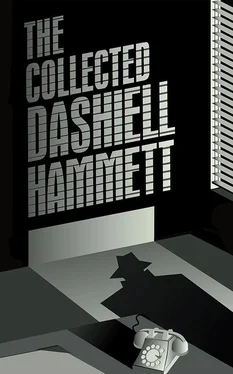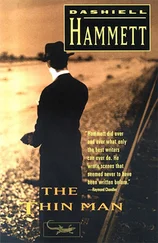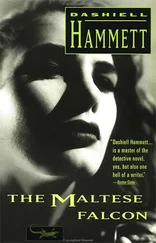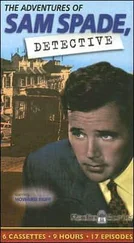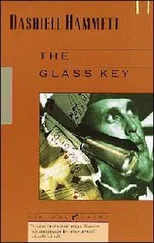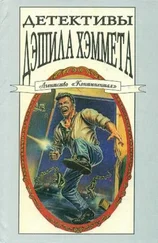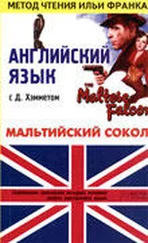“What do you make of that, Mr. Thin?” Miss Queenan, fairly bursting into the office, interrupted, brandishing a folded newspaper in Papa’s face.
Papa took the paper, read, and passed it to me.
“Cayterer’s dark horse,” he pronounced.
“I bet a nickel,” Miss Queenan agreed.
I too agreed with them when I had read the Canton dispatch reporting the finding of the body of a tuchun of one of the larger provinces. The tuchun’s widow, physician, and confidential secretary had been arrested, the report went on to say, charged with having poisoned him and concealed his death by means of a pretense that he had gone into the mountains for his health. They were believed to have deposited large sums of money in a Paris bank and to have been about to leave the country when arrested.”
“Waiting for Hop Cayterer’s contribution before they left,” Papa said. “Let’s go see him.”
Mr. Cayterer was noticeably ill at ease, worried, when Papa and I were shown into his office.
“You don’t happen to know—” he began immediately the how-do-you-do’s were over, and stopped. “Miss Brenham, my secretary, went out a little before noon and hasn’t come back.”
It wasn’t a question, but it was meant as one.
“She and your nephew were married, and she has gone with him.”
He nodded his large sallow head slowly, as if he had expected that information, or even as if he had feared it.
“Seen this?” Papa asked, giving him the newspaper.
Mr. Cayterer read the Canton dispatch with so expressionless a face that I began to entertain doubts that the tuchun of the dispatch was the tuchun of Mr. Cayterer’s plans; but, when he let the paper fall on the desk and made a little rumbling noise deep in his throat, I saw that the blankness of his face was the emptiness of utter consternation. The soft glow from his shaded desk light glinted on hundreds of tiny globules of moisture on his forehead.
“Your man?” Papa demanded.
“My man.”
“So. You’re lucky he didn’t cost you more than the thirty-five thousand you sent Throgmorton.”
Blankness went out of Mr. Cayterer’s face, to be replaced by surprise at the thought of how much money those three distant Chinese criminals might have cost him.
“And now,” Papa went on, “we can go to the Post Office Department for help in catching Mr. B. J. Randall.”
“Yes, we can,” — Mr. Cayterer avoided Papa’s eyes, feeling, “I fancied, that he would rather endure his loss than admit to the world that he had twice been so easily and so completely taken in... but—”
“The matter can be handled,” I came to his assistance, “quickly and without undue publicity.”
“Now what?” Papa questioned me suspiciously.
“I should like,” I spoke to Mr. Cayterer, ignoring Papa’s question, “to borrow one of your employees for a few minutes.”
“Which one?”
“The boy will do”
Mr. Cayterer stabbed one of the buttons on his desk, and the bright-eyed office boy appeared.
“See here,” I addressed the boy quite sternly, “you’ve caused an enormous amount of trouble with your Fitzmaurice Throgmorton foolishness, and I don’t want any more of it. You bring those drafts back here!”
“W-what do you mean?”
“I mean what I say,” quite sharply. “And don’t you ever play any more games like this, or you’ll be finding yourself in hot water with the Post Office Department. What is your middle name — James, or John, or Joseph?”
“It’s Jackson, but—”
“I suppose it is. Now where are those drafts?”
“They’re... I don’t know what you mean. They’re... they’re home, pasted in a sort of scrapbook.”
“You got hold of this Chinese business hearing your sister and Nugent talk about it?”
“Y-yes, sir.”
“And I suppose you sent forwarding address cards to Los Angeles, Portland and Spokane, to have Randall’s letters sent to General Delivery here.”
“Yes, sir.”
“Very well. Now go home and get those drafts and bring them here. Hurry.”
The boy darted out of the office.
“Well, I’ll be what he said!” Mr. Cayterer gasped. “But. why—? how—?”
“Very simply,” I explained, rising and picking up my hat. “I suspected him as soon as you said the letters were in your handwriting. That quite gratuitous bit of finesse must have appealed very strongly to him, but it quite gave him away. Office boys almost always imitate their employers’ handwriting: I have never heard of one who didn’t at least occasionally copy his boss’ signature. It’s one of the conventions of the position.
“Then, when you told us he was Miss Bren ham’s brother, and I found that she and Nugent were intimate, I knew where the boy could have got his information. They no doubt discussed your plans when he was calling on her in the evening, and the boy heard enough to go on. Further, as an alias, Fitzmaurice Throgmorton has a decidedly juvenile sound; and even its creator distrusted it for actual use, and so fashioned another alias for use at the post office. In fashioning that second one, B. J. Randall, he fell into a quite common error: he was, as people so often are, unable to get away from his own name, and retained his initials, reversing them.
“The fact that the drafts had not come through for collection was another supporting fact: regardless of his honesty, a boy of fifteen could not cash a ten-thousand-dollar draft. But I dare say it was never a matter of money with him: he got his fun out of playing the dashing Fitzmaurice Throgmorton. This Canton dispatch dispelled my last doubt: those people were trying to swindle you out of hundreds of thousands of dollars, and this smaller swindle delayed their success, quite demolished it in fact, so they could not have been responsible for it. I needed some assurance on that point, for the mature oriental mind frequently displays quite definite analogies with the juvenile occidental mind.”
“But look here!” Mr. Cayterer objected. “There were those letters. You saw them. They were mailed in Japan.”
“I beg your pardon, they were not. Japanese stamps can be procured of any stamp dealer, and a postmark is ridiculously easy to forge. Your office boy would, naturally, have no difficulty at all in getting the letters into, your mail.”
“There’s no use arguing with him,” Papa, getting up and clapping his hat on his head, assured Mr. Cayterer. “He’s right. Now what are you going to do about that kid?”
Anger pinkened Mr. Cayterer’s wan face.
“I’m going to—”
“Don’t fire him right away,” Papa advised. “Climb all over him, but don’t fire him. Handle him right and he’ll be worth a dozen boys, for a few weeks anyway, until his remorse wears thin. Then you can fire him, and you’ll have got that many weeks of good service out of him.”
On the heels of this — yes — thoroughly unscrupulous advice Papa and I left Mr. Cayterer’s office.
Black Mask, February 1926; aka: First Aide to Murder ( Saturday Home Magazine, April 8, 1938)
Gold on the door, edged with black, said ALEXANDER RUSH, PRIVATE DETECTIVE. Inside, an ugly man sat tilted back in a chair, his feet on a yellow desk.
The office was in no way lovely. Its furnishings were few and old with the shabby age of second-handom. A shredding square of dun carpet covered the floor. On one buff wall hung a framed certificate that licensed Alexander Rush to pursue the calling of private detective in the city of Baltimore in accordance with certain red-numbered regulations. A map of the city hung on another wall. Beneath the map a frail bookcase, small as it was, gaped emptily around its contents: a yellowish railway guide, a smaller hotel directory, and street and telephone directories for Baltimore, Washington, and Philadelphia. An insecure oaken clothes-tree held up a black derby and a black overcoat beside a white sink in one corner. The four chairs in the room were unrelated to one another in everything except age. The desk’s scarred top held, in addition to the proprietor’s feet, a telephone, a black-clotted inkwell, a disarray of papers having generally to do with criminals who had escaped from one prison or another, and a grayed ashtray that held as much ash and as many black cigar stumps as a tray of its size could expect to hold.
Читать дальше
